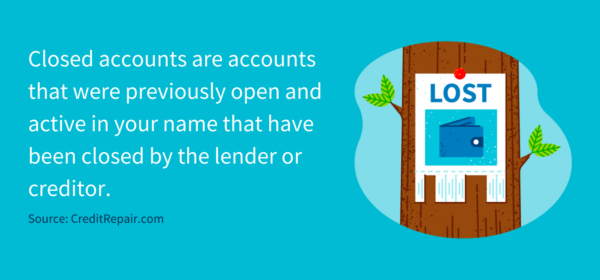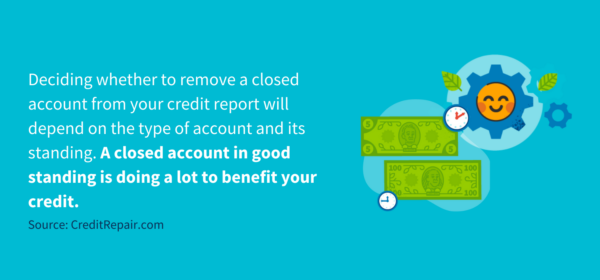
Disclosure regarding our editorial content standards.
When you notice the sudden appearance of closed accounts on your credit report, you may become concerned—after all, closed accounts can impact your credit score. The good news is that you have three options when it comes to removing a closed account from your credit report. You can dispute inaccurate information, send a goodwill letter or wait it out. Keep reading for more details on how each of those options works.
What are closed accounts and why are they still on my credit report?
Closed accounts are, as the name implies, accounts that were previously open and active in your name that have been closed by the lender or creditor. You can’t use a closed account and no longer have access to the funds or credit it came with.

Accounts may be closed for several reasons, including:
- You requested the closure because you no longer use the account
- You paid off the balance of the account in full
- You refinanced a new loan
- Your account was closed due to inactivity
- Your account was closed due to late payments
- There was a mistake and your account was closed without a valid reason
If you’re requesting that an account be closed, the closure process can take between one month and several months, depending on the lender. Lenders usually update their accounts every month, so it can take between one and two billing cycles for an account to be updated.
Once an account is updated as closed on your credit report, it doesn’t disappear. Accounts in good standing may stay on your report for up to 10 years, adding to your credit history. Conversely, an account in bad standing (accounts with missed or late payments or defaults) can stay on your report for up to seven years. This means the negative data on these closed accounts will continue to impact your credit for as long as they are on the report.
How do closed accounts affect my credit report?
There are a few ways in which a closed account may affect your credit:
Credit utilization
When an account closes, it can impact your credit utilization ratio. Let’s say you had three credit cards with a limit of $5,000 each, so $15,000 in credit total. Each month you spend $3,500 between all three cards, leaving you with a healthy credit utilization ratio of 23 percent. If one of these cards closes, your monthly spending of $3,500 across two cards with a combined limit of $10,000 means your ratio is now 35 percent.
It’s recommended you keep your ratio as low as possible to avoid a negative impact on your credit. So, if closing an account brings your utilization down enough, it can result in a drop in your credit score.
Credit history
A closed account can stay on your credit report for between seven and 10 years. Depending on the account’s standing, this could be a good thing or a bad thing. Accounts in good standing will continue to contribute to your credit positively for another 10 years.
On the other hand, accounts in bad standing—such as closed accounts with missed payments or default status—can continue to bring down your credit. As time goes on, the closed account will have a more negligible effect on your credit score, but it will still negatively impact your score for up to seven years.
Credit length
Your length of credit history makes up 15 percent of your credit score. Credit history length looks at how old your oldest account is, as well as the average age of all your accounts. When you close an account, it remains on your report and your credit length isn’t impacted. However, if it eventually falls off your report or you remove it, your credit history length could be greatly affected.
Let’s say you close your first credit card and, after the 10-year waiting period, the inactive account is removed from your credit report. Having your oldest credit card removed shortens your credit history and brings down the average of all your accounts. As a result, you may see a drop in your credit score. However, the good news is that this drop is usually temporary, and your score should recover in a few months.
Credit mix
Your credit mix makes up 10 percent of your credit score. A healthy credit mix is one that includes both installment accounts (mortgage, car loan, student loan) and revolving accounts (credit card, personal loan). If a closed account drops from your credit report and it was the only revolving or installment account you had, it will mean you no longer have a healthy credit mix.
Let’s say the closed account that drops off your credit report was your student loan, and it was your only installment account. Now, your credit report only has revolving accounts on it, leaving you with a less-than-ideal credit mix, which can result in a credit score drop.
Should I remove closed accounts from my credit report?

Deciding whether to remove a closed account from your credit report will depend on the type of account and its standing. As we’ve mentioned before, a closed account in good standing is doing a lot to benefit your credit.
It could be adding positive payment history to your account, keeping your credit mix healthy and/or extending your credit length. In this scenario, there’s no benefit to removing the closed account from your report. In fact, it can result in a credit score drop if you do remove the account.
When you should remove closed accounts
Of course, if a closed account is in bad standing, it’ll be helpful to remove it from your credit report. Consider removing closed accounts that have missed payments, late payments or defaults attached to them.
How do I remove closed accounts from my credit report?
There are three main ways you can try to remove a closed account from your credit report.
1. Dispute inaccurate information
The first step you should take is to review the account and make sure all the details are correct. If anything associated with the closed account is inaccurate, such as dates, amounts, lender information or more, you can file a dispute.
You can send a letter to each of the three major credit bureaus (Experian, Equifax and TransUnion) explaining what information is incorrect. Under the Fair Credit Reporting Act (FCRA), all credit reporting agencies must correct or delete invalid details, as each consumer is entitled to an accurate credit report.
After you file a dispute, the credit bureau will have 30 days to investigate. It will reach out to the lender or creditor that provided the information and ask for verification. After the investigation is complete, the bureau will inform you if the information has been corrected or has been removed.
Note that filing a dispute doesn’t guarantee a closed account will be removed entirely. Instead, the account could just be updated, or a negative item associated with the account could be removed.
2. Write a “goodwill” letter
If everything about the closed account is accurate, filing a dispute isn’t an option. Instead, the next step is to consider writing a “goodwill” letter to the lender of the account. This letter is a formal request that the lender removes the closed account, and all its associated history, from your credit report.
Note that creditors are under no legal obligation to approve or respond to this type of request. In fact, goodwill letters are typically only effective if you have a longstanding, good relationship with the lender.
Additionally, some creditors may be willing to consider a goodwill letter request if you can explain that you fell on hard times, which resulted in the negative items associated with your account.
Generally speaking, creditors and lenders may be willing to remove late or missed payment information but won’t remove more serious breaches, such as repossessions and collections.
3. Wait for the closed account to be removed
If the above two options don’t work, the last step is to wait out the closed account. Eventually, the closed account will fall off your credit report—either in seven or 10 years. And while that may sound like a long time, as the years go on, the closed account will have less and less of an impact on your credit.
If you’re concerned about how a closed account affects your credit, you could focus on repairing other areas of your credit instead. The professionals at CreditRepair.com can review your credit report and help you get back on track.
Note: The information provided on CreditRepair.com does not, and is not intended to, act as legal, financial or credit advice; instead, it is for general informational purposes only.
Questions about credit repair?
Chat with an expert: 1-800-255-0263






